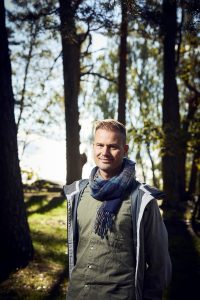Professor Michael Butter (University of Tübingen)
Abstract title: conspiracy theories, populism, democracy
The success of populist movements around the world in the past two decades has sparked an intensive debate about their relationship to democracy. The same is true for conspiracy theories, not least because they are often quite prominent within these movements. Drawing mainly on examples from Germany, Hungary and the United States, this talk will attempt a systematic exploration of the relationship between conspiracy theory, populism, and democracy, with a focus on the links between the first two. I will argue that conspiracy theories are best seen as a non-necessary element of populist discourse. How many members of a populist party or movement believe in conspiracy theories depends on how accepted they are in a specific political culture, on whether they can only function as counter-narratives or can constitute the official version of events. I will also argue that there is no automatic link between conspiracism and extremism, antisemitism, racism, or anti-democratic attitudes. However, due to their status as stigmatized knowledge in most western democracies, conspiracy theories are more often than not tied to such problematic convictions there.

Michael Butter has been Professor of American Literary and Cultural History at the University of Tübingen since 2014. He received his PhD from the University of Bonn in 2007 and his Habilitation from the University of Freiburg in 2012. He is the co-editor of the Routledge Handbook of Conspiracy Theories (2022) and the author of the following monographs: The Epitome of Evil: Hitler in American Fiction, 1939–2002 (New York: Palgrave, 2009), Plots, Designs, and Schemes: American Conspiracy Theories from the Puritans to the Present (Berlin/Boston: de Gruyter, 2014), and “Nichts ist, wie es scheint”: Über Verschwörungstheorien (Berlin: Suhrkamp, 2018), a German introduction to conspiracy theories aimed at a general audience which was translated into English as The Nature of Conspiracy Theories (London: Polity, 2020). Translations into Portuguese and Polish have been published in 2022.
Associate Professor Elżbieta Korolczuk (Södertörn University and University of Warsaw)
Abstract title: Gender denialism in contemporary Europe: the anti-gender campaigns in the populist moment
In recent decade we have witnessed the rise of global anti-gender campaigns, which include opposition to anti-discriminatory education, abortion, LGBTQ rights and legislation aimed to counteract gender-based violence. Anti-genderism, however, is more than just a desire to stop social change in the sphere of sexuality, gender and reproduction. It is a coherent worldview and a body of knowledge whose proponents aspire to legitimacy in academia and transnational institutions. The set of ideas that come under the name of anti-genderism is marked by internal coherence and remarkable flexibility, but at its core lies the view that gender roles and ideals are embedded in biology or God-given rather than socially constructed. “Gender” is associated with collapsing natural differences; it is presented as a danger to children, family and reproduction; and as an imposition of global elites on local people.
The anti-gender movement seeks not only political influence but also epistemic power (Korolczuk 2020, Paternotte and Verloo 2021, Peto 2022). The ultraconservative actors challenge the validity of gender studies and non-discriminatory education, attack scholars who focus on gender and sexuality, and aim to change the curricula that are not in line with ultraconservative worldview. The goal is not only to dismantle existing academic institutions and limit academic freedom in the sphere of gender studies, but to establish new bodies and practices of knowledge production, and form a new intellectual elite, effectively opposing the existing liberal and left-leaning one. The anti-gender movement promotes its own intellectual authorities, produces conservative knowledge – a counterknowledge – on gender and sexuality, and aims to gain visibility in existing institutions of higher learning as well as to establish new ones. The electoral successes of right-wing populist parties provide an excellent discursive and political opportunity to pursue both political and discursive hegemony by the ultraconservative actors. This presentation will analyze how counterknowledge on gender and sexuality is being produced and legitimized in contemporary Europe by ultraconservative actors in tandem with right-wing populists.

Elżbieta Korolczuk, PhD is a sociologist, working at Södertörn University in Stockholm and American Studies Center, Warsaw University. Her research interests involve: gender, social movements and civil society. She published numerous texts, e.g. on the women’s movement and its relation with neoliberalism, on new forms of citizenship, politicization of reproduction and anti-gender mobilization in Poland and abroad. Most recent publications include two edited volumes: Civil Society Revisited: Lessons from Poland co-edited with Kerstin Jacobsson (Berghahn Books, 2017), Rebellious Parents: Parental Movements in Central-Eastern Europe and Russia co-edited with Katalin Fábián (Indiana University Press, 2017), and a monograph co-authored with Agnieszka Graff Anti-gender Politics in the Populist Moment (Routledge 2021).
Associate Professor Martin Hultman (Chalmers University)
Abstact title: Climate Obstruction: How Propaganda, Conspiracies and Apathy are Heating the Planet
Why don’t we act when the existential danger of climate emergency has been communicated by scientists et.al. for over thirty years and we experience it on a yearly basis? Presenting research results from the interdisciplinary Centre for Studies of Climate Change Denial (CEFORCED) and the new book Climate Obstruction. How Denial, Delay and Inaction are Heating the Planet associate professor Martin Hultman introduces the scholarly knowledge in the field.

Associate Professor Martin Hultman is widely published in energy and climate issues, especially notable are the articles ‘A green fatwā? Climate change as a threat to the masculinity of industrial modernity’ and ‘Dead White men vs. Greta Thunberg: Nationalism, Misogyny, and Climate Change Denial in Swedish far-right Digital Media’ then the books Discourses of Global Climate Change, Ecological Masculinities and Men, Masculinities and Earth. As part of his academic endavour he publish chronicles in a wide range of newspapers, give public lectures on contemporary politics and advice NGO:s as well as governmental agencies. Hultman leads three research groups analyzing ‘gender and energy’, ‘ecopreneurship in circular economies’ and ‘climate change denial’ at Chalmers University of Technology. He is currently writing on a book with the preliminary title Ecopedagogy for Earth Rights. Co-creating a Vibrant Culture of Peace.
